The Finnish language is full of expressions that describe the unique aspects of the Finnish mindset and culture.
For example, if a Finn is broke, he might use the expression “I have Matti in my purse” (olla Matti kukkarossa) to describe the situation when translated word for word into English.
Matti is a name often used in proverbs as a synonym for man. This specific saying is thought to be based on the Book of Matthew in the bible.
Finnish expressions come in all shapes and sizes, but I’ve noticed that such proverbs and idioms are especially common when it comes to nature, animals, and food.
The examples we use to describe a situation are often something so familiar, everyone can immediately relate to them. Just think about being “hungry like a wolf” which in Finnish translates to having “a wolf’s hunger” (sudennälkä), or sleeping like a log (nukkua kuin tukki).
Follow me on Instagram and get more Finland into your daily life immediately!
Näytä tämä julkaisu Instagramissa.
I hope that this article of 50 funny Finnish phrases and words in English will help you become a little bit more familiar with how the Finns think about the world around them.
If you’re curious about learning easy Finnish, I’d love to see you in my free Finnish class – Spark Your Finnish. After taking this class, you’ll know how to say any Finnish word and see why Finnish isn’t impossible, thanks to my secret ingredient.
But now, are you ready to learn some Finnish phrases and words that describe the Finnish mindset? If you can, grab a cup of coffee and a cinnamon bun (more about those soon) and let’s dive in.
Table of Contents
Funny Nature-filled Finnish Phrases in English
Deep down in our hearts, Finns are still forest people, even now in the modern world. There are many funny expressions referring to nature that are used in Finnish.
Sataa kuin Esterin perseestä – To rain like from Ester’s ass
No one knows exactly where this colorful Finnish expression comes from, but it’s used for heavy rain.
Some guesses include the Finnish tradition of name days: days in the calendar dedicated to specific names. The day for celebrating the name ‘Ester’ in May could have been thought of as particularly prone for rain.
Another possible explanation is that the saying originated from a fire brigade that had an Esteri firefighting pump, still manufactured today.
Vapisee kuin haavan lehti – To tremble like the leaf of an aspen tree
Europeans and Americans might be familiar with the trembling or quaking aspen, as these common trees are called around the world. This Finnish saying also refers to the trembling caused by the shape of the leaf.
Olla kuin myrskyn merkki – To be like a sign of a storm
This phrase is used to describe someone who is visibly angry or upset. A storm is about to erupt, so stay out of the way!
“Myrskynmerkit” as a word became popular due to the early almanacs. They included information about the movements of the planets, the sun and the moon. The information was used to predict the weather such as storms and the signs used to depict different planets were therefore called signs of a storm.
Olla hyvällä tuulella – To be on a good wind
Being in a good mood is often described as being on a good wind in Finnish. A bad wind is also a possibility aka ‘olla huonolla tuulella’, in Finnish.

Menneen talven lumia – The snow of the past winter
It’s not worth it to think about old snow, already long gone. This phrase can mean something is old news or not worth talking about anymore.
Olla kuin puusta pudonnut – To seem like you just fell out of a tree
Falling out of a tree is, of course, a dramatic experience. This phrase describes that feeling of finding yourself out of place or observing someone who is disoriented or unsure.
Olla latvasta laho – To be rotten at the top of the tree
For the top of the tree to be rotten, when referring to a person, is not a great compliment in Finnish. Unlike in English, here, the phrase means the person is stupid, not evil.
Olla pihkassa – To be in the resin
When Finns are smitten, they get stuck on resin. This is an innocent way of suggesting someone has a crush.
Olla kuin puulla päähän lyöty – To be like you were hit on the head with wood
Being hit on the head with wood is not a pleasant image. It will leave you slightly disoriented or shocked. The phrase means just that: surprised and shocked by an event.
Kasvaa kuin sieniä sateella – To grow like mushrooms in the rain
This expression might have its roots in the culture of picking food like mushrooms and berries from the forest.
Even those Finns who don’t pick their food know that this phrase means something is appearing fast.
How to connect with the finns
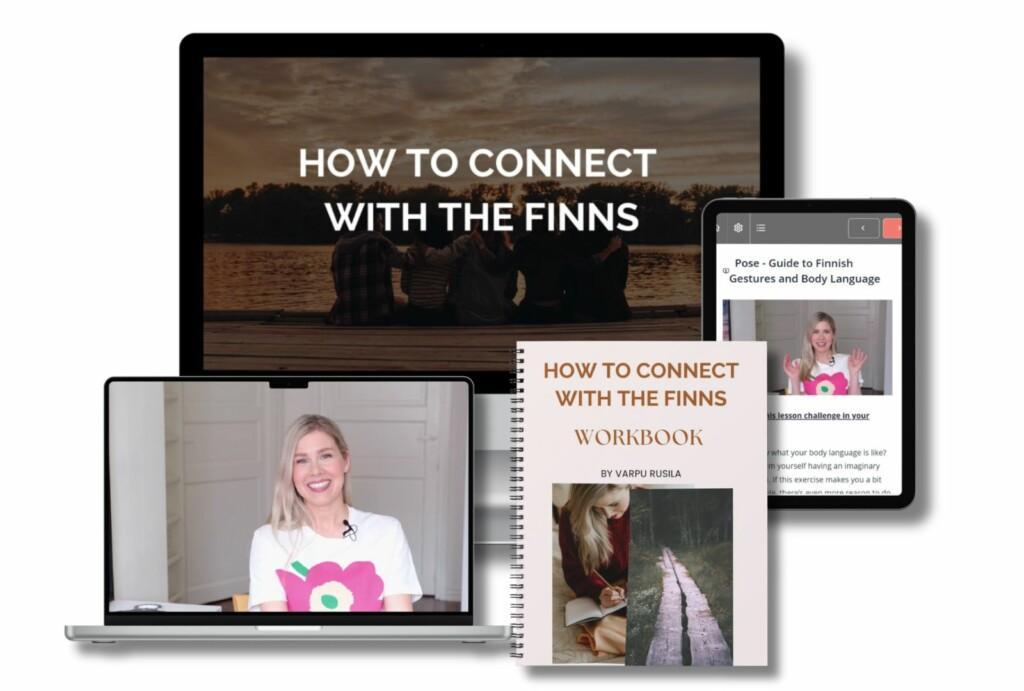
Understand Finns even better and build relationships with confidence. ⭐⭐⭐⭐⭐
Olla pullahiiri – To be a bun mouse
A bun mouse, pullahiiri, has a sweet tooth.
Never underestimate the Finns’ love for sweet cinnamon and butter buns, which are traditionally enjoyed with coffee. When combined the two are called bun coffees aka ‘pullakahvit’, in Finnish.
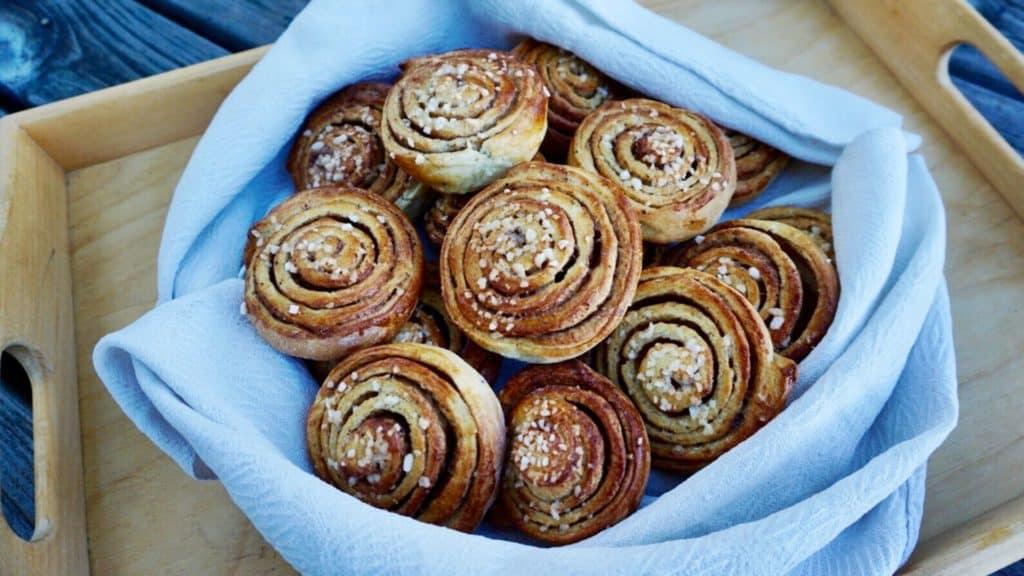
Sano muikku – Say vendance fish
When Finns take a photo together, we don’t say cheese, but muikku.
Fried vendace, muikku, is a Finnish fast-food you will find freshly served in Kauppatori in Helsinki as well as around lake Saimaa.
Loppua kuin kananlento – To end like the flight of a chicken
Finns don’t want their endeavors to end like the flight of a chicken. The phrase is used to describe something ending quickly and unsuccessfully, similar to “over before it started”.
Nostaa kissa pöydälle – To lift the cat up onto the table
It’s time to discuss a serious matter that hasn’t been talked about, when the Finns lift the cat up onto the table.
The phrase is said to originate from lifting the cat up onto the table to check whether it is female or male, in other words, for close inspection.
Lähteä kuin telkkä pöntöstä – To leave like a goldeneye from the birdhouse
If you leave like a goldeneye, you leave, wherever you are, fast.
Goldeneyes leave their nest only a day after hatching. The bird mother ensures the surroundings are safe and commands everybody out.
Leaving the birdhouse takes less than a minute even though the young are not yet capable of flying and fall to the soft ground.
Olla kuin perseeseen ammuttu karhu – To be like a bear shot in the ass
This one requires no lengthy explanations. A bear shot in the ass is pissed off.
Aasinsilta – A bridge of the donkey
A bridge of the donkey is used to describe a transition from one topic to another. When two things are not connected, Finns may say they are using a sentence as a donkey’s bridge to get to the next topic.
The phrase exists in many other languages such as Swedish, German and Latin.
It originally refers to a tool invented by the philosopher Jean Buridan to illustrate some of Aristotle’s logical principles. Later the word was used for descriptions added to texts written in Greek and Latin so that even the not so bright students, “donkeys”, could understand them.
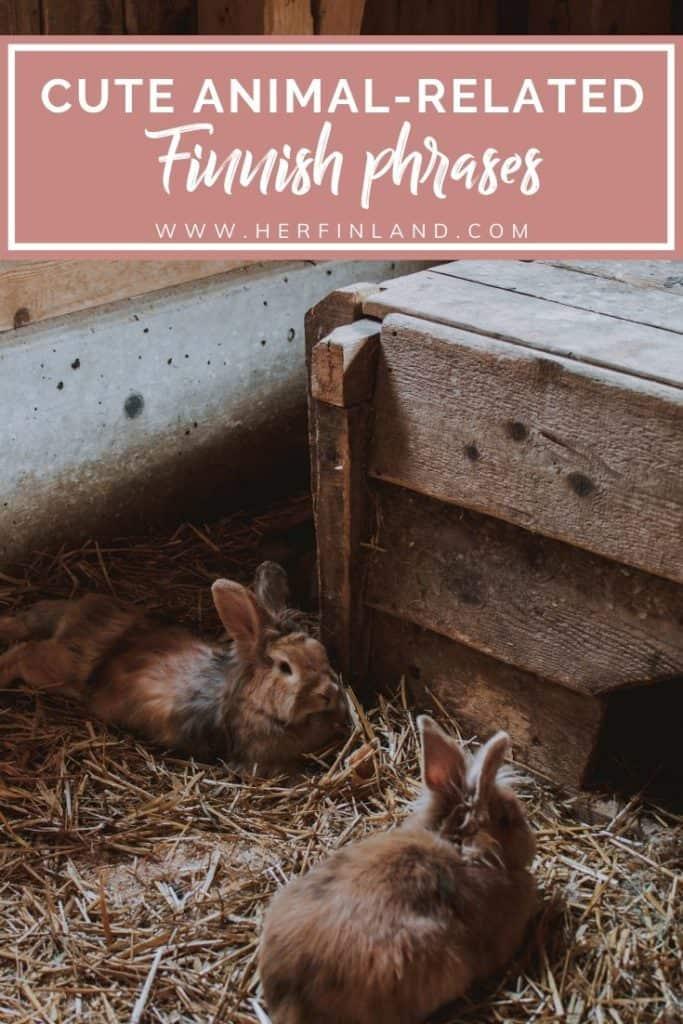
Jänishousu – Rabbit pants
If you are wearing rabbit pants, most often referred to in Finnish as being a rabbit pants, you’re a coward, “scaredy cat” or “chicken”.
Rabbits are seen as fearful and easily scared and if you ‘jänistää’, you leave something undone because you are too afraid to do it.
Olla jäniksen selässä – To be on a rabbit’s back
Remember the rabbit from Alice in Wonderland? To be on a rabbit’s back refers to this kind of a rushing bunny, where the going might get rough.
Finns will most often say they’re not on a rabbit’s back to describe the matter is not urgent.
Olla ketunhäntä kainalossa – To hold the fox’s tail under your arm
In Finland, liars hold the fox’s tail under their arm. Foxes, in general, are thought of as clever and a little devious or sly.
FinNISH CONNECTION COLLECTION 🇫🇮
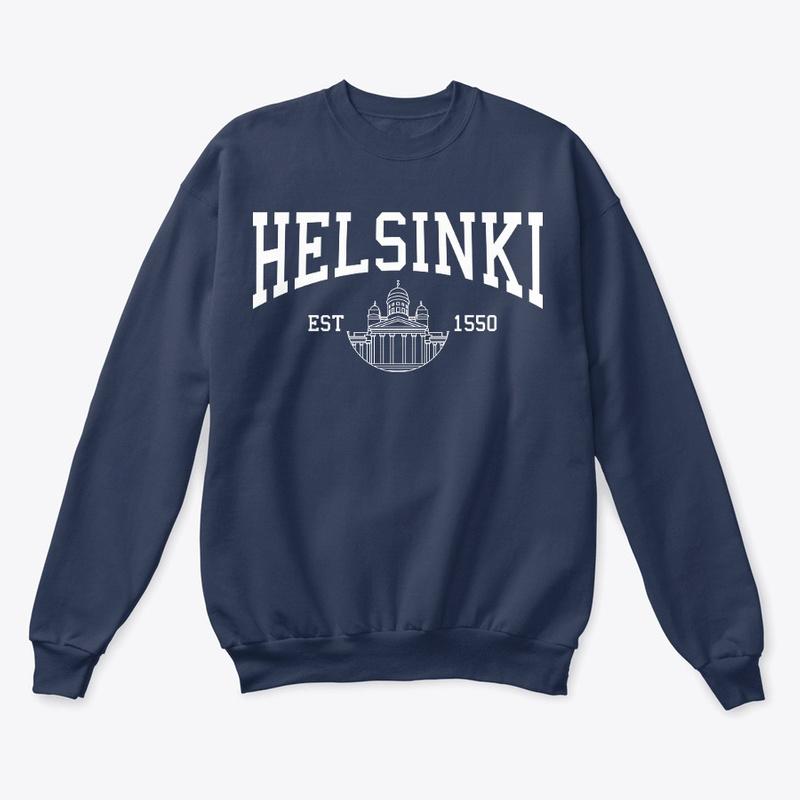
Finland-themed sweaters and accessories made-to-order. 🧡 Worldwide shipping.
Kuuma peruna – Hot potato
Similar to English, when something is a hot potato, it is hotly debated and can be problematic to discuss.
Poimia rusinat pullasta – To pick the raisins out of the bun
Raisin buns are a traditional variety of the well-loved coffee buns. Someone who is picking the raisins out of the bun is only picking the best part and leaving the rest.
Heittää lusikka nurkkaan – To throw the spoon in the corner
A person throwing a spoon in the corner is not merely showing a sign of discontent with their food. They are dead.
Other languages have similar sayings about spoons. Death has been considered a taboo, which has led a variety of phrases describing it.
Early on, spoons were valuable and everyone in the family had their own spoon that they took good care of and took with them when travelling or attending parties.
Sokerina pohjalla – As sugar at the bottom
The sugar at the bottom is something good that is left as last. The saying is used in similar ways as “to save the best for last”.
Moni kakku päältä kaunis – Many cakes are pretty on the outside
“Not everything is how it first appears to be” is the essence of this expression. This slightly pessimistic saying is used in situations where people or situations are expected to reveal a nasty surprise.
The phrase is used in a similar way to “you can’t judge a book by its cover”.

Melkoinen soppa – Quite a soup
If you cause quite a soup, things have gone badly wrong and are difficult to untangle. For example, this phrase can be used to describe the turns of a messy relationship.
Nakki – Frankfurter, wiener or a hot dog
Nakki means a frankfurter or a wiener (hot dog), but assume it only refers to food, and you might end up working hard.
For example, to give someone one or more of these sausages, nakittaa, means giving them a task to take care of, or many tasks.
On the other hand, when something is an easy or sure sausage, helppo nakki or varma nakki, Finns are assuming things to go smoothly and without problems.
To combine the last two funny phrases, we get “quite a frankfurter soup”, melkoinen nakkisoppa but that is, luckily, only a Finnish dish.
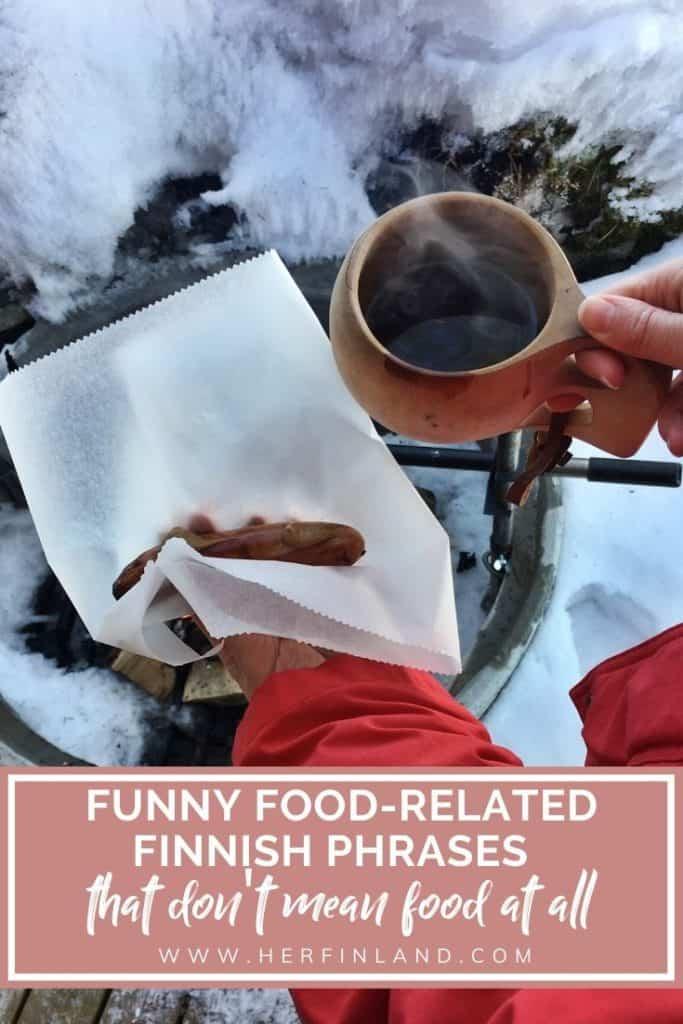
Lusia kakku – To serve your cake
Similar to sausages, you might think to get a cake to eat sounds pretty easy and fun. Don’t make a mistake here, though, as this saying refers to someone serving a prison sentence.
Sillit suolassa – To be like herrings in salt
This is an expression used to describe too many people in a small space. Traditionally whole herrings were preserved in salt in barrels.
Pullat hyvin uunissa – Buns well in the oven
Since Finns love buns, it is no surprise we also use the saying “bun in the oven”, but the same phrase can be used for people who are not pregnant.
When a Finn says someone has their buns in the oven well, they mean things are going well.
Maksaa mansikoita – To cost strawberries
Strawberries are the traditional (and the best, if you ask me) summer treat to enjoy in Finland.
Finns love strawberries so much that no matter what the price, we buy them. This phare is a funny way to say that something is very expensive.
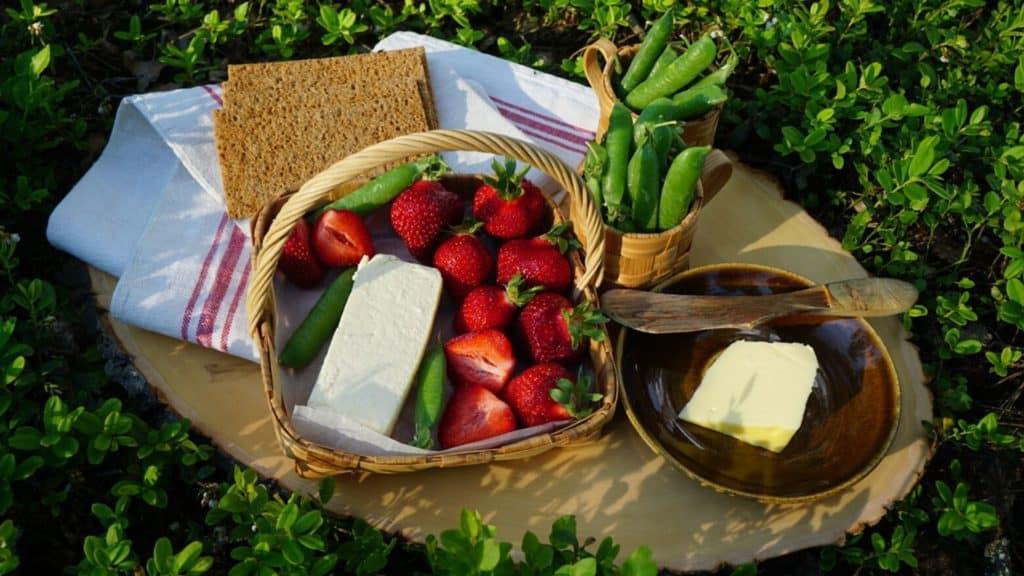
Untranslatable Finnish Words & Expressions Explained in English
Sisu
The most famous untraslatable Finnish word must be the word ”sisu”. Sisu is a word used for a specific kind of grit, determination, and bravery in the face of obstacles and challenges.
Sometimes translated into “Finnish spirit”, having sisu allows a person to keep going when others would consider a task impossible or give up.
Löyly
In traditional Finnish saunas, water is ladled from a bucket onto hot rocks within the wood-burning or electric stove. The hot steam that arises from the rocks is called “löyly”. Since the temperature of the sauna is a personal preference and increases with the steam, a Finn will often politely ask you, if it is fine to “throw” more water on the rocks, “heittää löylyä”.
No niin
This combination of words that could be translated, for example, as “that’s it”, “alright then” or “oh well”. This expression is famous for being able to express nearly anything a Finn might need to say to anyone.
Comedian Ismo Leikola has gone as far as to suggest this should be the first thing to teach anyone learning Finnish and the most useful expression in the whole language!
According to Leikola, “No niin” can be used to get everyone’s attention, for example, when you start a speech, but it can also signal the end of your speech. A mother might use this phrase to tell her children to stop running around, but if they still make a mess by breaking a vase, she can use the same phrase to express “didn’t I tell you so”.
You might utter the phrase to signal your frustration when you see the long line at the checkout and when you finally get there, well, of course, you will say “no niin!” as you can finally pay for your groceries.
Sielunmaisema
Sielunmaisema, the landscape of the soul, can be used to describe an important scene imprinted in memory, such as where you were born or where you spend time in nature. It’s a place where your body an mind are at peace.
On the other hand, it can describe aspects of a person or groups of people that define them, for example, “the soul-landscape of a Finnish man”.
Vieraskorea
When you change your behavior when guests are around, drop your bad habits, act more courteous, and perhaps even pretend to do things differently from what you would typically do, you might be “guest flamboyant” or “guest courteous”. Note that the word is used to mean negative and positive behavior.
Kalsarikännit
Pants drunk, kalsarikännit, is a Finnish word adopted by the world to the extent that it has its own emoji.
It describes drinking alone at home in your underwear and embracing not having to perform for your social media feeds, but simply enjoying a drink at home. Partners and close friends can take part, but the atmosphere needs to be relaxed and unpretentious.

Metsäsuhde
The Finnish relationship with the forest, metsäsuhde, has been officially recognized and might become part of the intangible cultural heritage list.
According to the official website, metsäsuhde “is part of an individual’s identity and personal relationship with the environment that evolves through different stages of life.”
Herrankukkaro
“In Lord’s purse”, which means to be safe, is a phrase that originates from the Finnish translation of the bible (1 SAM 25:29), but it is commonly used without a religious connection.
Kissanristiäiset
The christening of a cat is not seen as very important, and Finns use this phrase to describe an event or many events that are not worth going to.
Myötähäpeä
Have you ever shared a sense of shame or embarrassment when someone else makes a fool of themselves? That feeling is secondhand embarrassment, myötähäpeä.
Yökyöpeli
If you are yökyöpeli (night ghost/devil), it means you like to stay up very late. “Kyöpeli” is a very old Finnish words and Easter witches also fly to Kyöpelinvuori (Devil’s mountain) in the Finnish folklore.
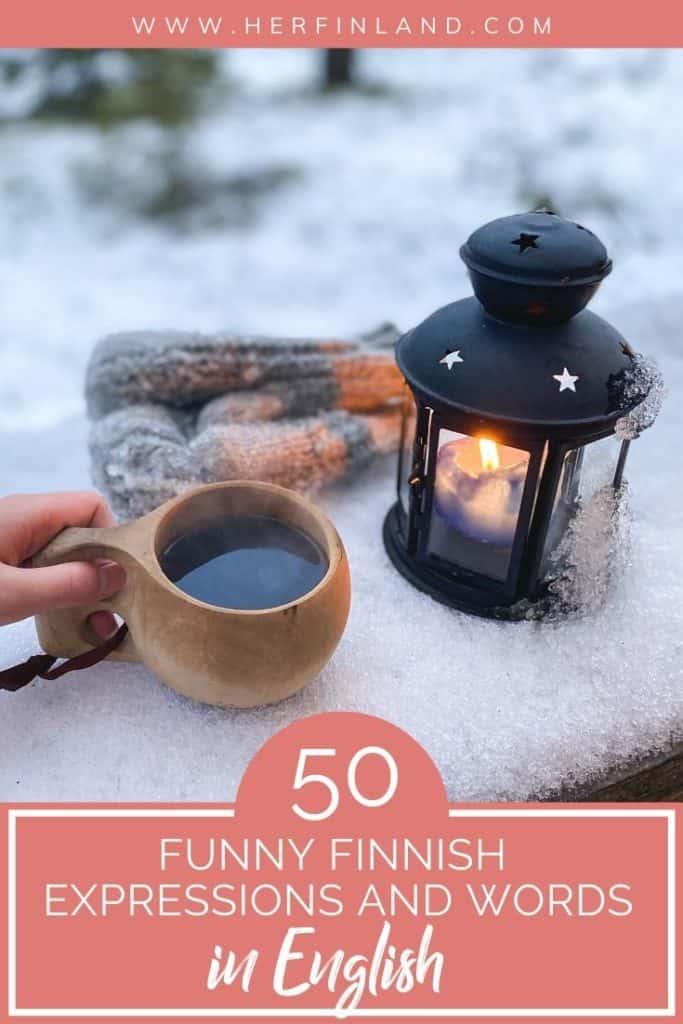
Kuksa
The traditional wooden cup used in Finland.
Kantohanki
I’m always waiting for kantohanki weather in winter. Kantohanki means packed snow that can carry your weight.
Kanto comes from the Finnish verb to carry (kantaa) and hanki is a type of packed snow. It’s fantastic to walk on top of snow so that you don’t sink into it.
Kahvihammasta kolottaa
You may know Finns, love their coffee but have you heard this funny phrase?
Finland is one of the top coffee-consuming countries in the world, so it’s only right that we have a phrase for when you’re craving a cup of coffee.
In Finnish we say, “kahvihammasta kolottaa” which literally translates to “coffee tooth is aching.”
Wow, there you have it, the list of 50+ funny Finnish phrases and words that describe the Finnish mindset.
Idioms and phrases can tell plenty about the culture, don’t you think? Which one of these Finnish expressions or words is your favorite? I’d love to know in the comments.
Are You Interested in Learning More Finnish?
If you’re curious about learning Finnish, here’s your chance to discover the Finnish language.
With my Conversational Finnish for Beginners Course, you’ll learn the easiest methods to start speaking Finnish right away. To get a small taste of this course and jumpstart your Finnish learning, enroll in my FREE Finnish class – Spark Your Finnish.
After taking this class, you’ll learn that Finnish isn’t as scary as they say.
Join over 18 200 students who are becoming confident Finnish speakers with my online courses. By enrolling into any course, you’ll also receive goldmines of helpful Finnish tips straight to your e-mail box.
I can’t wait to help you with your Finnish language journey!

Enroll in Spark Your Finnish free Finnish class today and start learning easy Finnish.
Looking for more information about Finnish culture and the Finnish language? Check out some of my other posts:
- 30 Cultural Facts on Finland that Help You Understand Finns
- Free Finnish Class – Spark Your Finnish
- How to Make Finnish Friends
- Finnish Greetings: How to Use Them and the One Word You’ll Need
- How to Behave in a Finnish Sauna
References used for this article: Tiede-lehti, Suomen Kielitoimisto, Helsingin kaupunginkirjasto, kirjastot.fi, Kouvolan Sanomat 26.5.2018, Jukka Parkkinen: Aasinsilta ajan hermolla and Almanakkatoimisto.


HF
Monday 15th of May 2023
Lusia kakku – To serve your cake
Similar to sausages, you might think to get a cake to eat sounds pretty easy and fun. Don’t make a mistake here, though, as this saying refers to someone serving a prison sentence.
How'd *that* happen?! :0
Helen
Friday 20th of August 2021
interesting to me the differences from germans of the to me well known parts to finns are most times not that big! which is cool.
the duvet cover you mentioned in another post and the "one blanket per person" issue is normal in germany. when being first in the usa i got nearly ballistic with the thought: sharing the blanket which happened in a hotel in new york to my friend and me (she ended up with the linen, me with the blanket :-D )
ok sudennälkä i know this as "bärenhunger" being hungry as a bear, karhunnälkä which is quite common in germany!
Varpu
Wednesday 8th of September 2021
Hei Helen! Thank you so much for this lovely comment!!! I really appreciate it. There are also sayings that are very similar between German and Finnish, it's so fascinating!
Joanne
Tuesday 24th of November 2020
Hei Varpu
I like to listen to people speaking in Finnish. So I’ll listen to whatever I can find online and play it in the background while I’m in the kitchen. I can pick out words here and there and it’s always exciting when I do.
I heard an interview with someone from Finland but it was in English. The man said something like “it was soup serious”. In the context of the interview it sounded like he was describing desperation but I wondered it was a saying or phrase in Finnish?
I tried to find it again in my browser history but nothing similar came up.
Kiitos! ?
Varpu
Wednesday 2nd of December 2020
Hei Joanna! Thank you so much for your comment and a fantastic idea to improve one's Finnish skills! About the soup... maybe it would be spoken Finnish: soppa means a soup in Finnish BUT also a mess! For example: Mikä soppa! Means what a mess/messy situation.
Agata
Sunday 25th of October 2020
I adore your blog as it’s an incredible gold mine of information! I enjoy getting to know Finnish language and culture even more thanks to your posts ? kiitos!
Varpu
Friday 30th of October 2020
Hei Agata, thank you sooo much! I'm so happy to hear this, kiitos! <3
Andrea
Tuesday 22nd of September 2020
Myötähäpeä... That's a fantastic word. In Spanish, we simply call it "pena ajena."
Varpu
Monday 12th of October 2020
Hei Andrea! Yes! That's a great word!!! :D Thank you so much for sharing <3